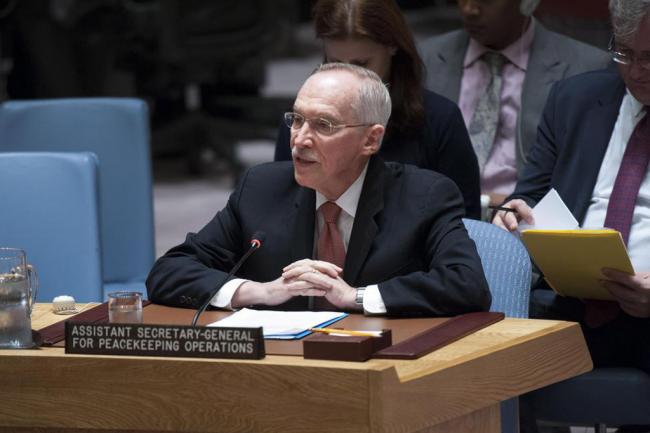
Amid situation in Darfur, UN peacekeeping official urges political settlement
In his briefing to the Council, Assistant Secretary-General for UN Peacekeeping Operations Edmond Mulet said operations against the non-signatory armed movements, implemented by the Sudanese Government, which involved a series of violent ground clashes and aerial bombardment, had led to over 104,000 newly confirmed displacements, as well as 69,000 unconfirmed cases.
He went on to say that there had been “no pause in inter-communal conflicts, which remains a major source of instability,” resulting in approximately one third of all conflict-related fatalities and forty per cent of displacement so far this year.
Mulet noted that the disputes have been further exacerbated by the involvement of local armed groups in counter-insurgency operations against the armed movements, their access to weapons, continued local influence and widespread impunity for their attacks against other tribes and other criminal activities.
The UN official added that the Government of Sudan, particularly at the state level, has attempted to contain the violence through the swift deployment of security forces across Darfur, and the organization of inter-communal mediation conferences for the cessation of hostilities.
“However, the underlying causes of these conflicts, related to the use and management of resources and impunity of actors involved in the violence, remain unaddressed,” said Mulet.
He further noted that following the decrees provided by the Government, a two-month cessation of hostilities in Darfur, Southern Kordofan and Blue Nile states and an unconditional pardon to members of the Sudanese political and armed opposition who decide to participate in the National Dialogue process, the Sudan Revolutionary Front declared its own six-month cessation of hostilities in Darfur and the Two Areas in accordance with its roadmap of 14 September.
The roadmap, Mulet explained, provides for the protection of civilians, unhindered humanitarian access and the creation of a conducive environment for peace talks and the National Dialogue.
Further, he said that President Omar al-Bashir has highlighted his Government’s readiness to engage in discussions on a permanent ceasefire with the armed movements.
However, the UN official said that the Sudanese political and armed opposition reiterated their boycott of the process in the absence of a conducive environment for a genuine dialogue but expressed their willingness to participate in a pre-dialogue meeting in Addis Ababa under the auspices of the African Union High-level Implementation Panel (AUHIP).
“The AUHIP meeting on the National Dialogue followed by cessation of hostilities talks on Darfur and the Two Areas, which were initially scheduled for next week, are now expected to take place, respectively, in Addis Ababa on 16 to 17 and 18 to 19 November,” said Mulet.
He also reiterated the difficulties faced by African Union-United Nations Mission in Darfur (UNAMID) and humanitarian actors in the region as the Government continues to restrict their air and ground movement, primarily to conflict areas citing security concerns.
“Delays and denials of customs clearances for UNAMID containers, including food rations, and visas for staff by the Government have threatened to significantly undermine mandate implementation efforts,” said Mulet.
“I would like to urge the Government of Sudan to maintain its current cooperation in ensuring the swift clearance of UNAMID food rations and their delivery to the Mission,” he added.
Mulet further called upon the Government to lift all existing restrictions on the free movement of its personnel and assets, particularly with regard to access to conflict areas and, importantly, the issuance of visas, consistent with the provisions of the UNAMID Status-of-Forces Agreement.
He also reported of an increase in attacks against UNAMID and its personnel, including the killing of a South African peacekeeper by an armed group north of Mellit, Darfur, on 27 September.
“Despite these considerable obstacles, UNAMID remained steadfast in the implementation of its strategic priorities and addressing key challenges to mandate implementation,” said Mulet.
“The Mission also focused its efforts on developing early warning capacity and other preventive measures with local stakeholders, promoting dialogue between farming and pastoral communities and supporting local institutions to address the root causes of conflict, in collaboration with the United Nations Country Team,” he added.
Lastly, Mulet also said that UNAMID and the UN Country Team are continuing their work on developing an operational plan for the gradual and phased transfer of tasks to the latter, outlining which tasks will be conducted jointly or transferred and the requisite budgetary requirements, in accordance with Council resolutions 2173 (2014) and 2228 (2015).
“The initial phases of the process are expected to focus on capacity-building of sexual and gender-based violence prevention mechanisms, and joint activities in the police, justice and corrections sector,” concluded Mulet.
UN Photo/Kim Haughton
Support Our Journalism
We cannot do without you.. your contribution supports unbiased journalism
IBNS is not driven by any ism- not wokeism, not racism, not skewed secularism, not hyper right-wing or left liberal ideals, nor by any hardline religious beliefs or hyper nationalism. We want to serve you good old objective news, as they are. We do not judge or preach. We let people decide for themselves. We only try to present factual and well-sourced news.







